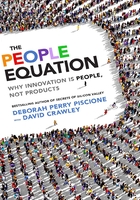
CHAPTER 2 THE PROCESS: IMPROVISATIONAL INNOVATION
Pat Younge, former chief creative officer at the BBC, was looking to find ways to generate ideas for programs that would better connect across generational differences and cohorts in the United Kingdom. The BBC had operated much the same way for eighty years, but with the advancement of technology and introduction of social media, audience behaviors had thrown what the BBC had known up on its head. “We were losing ground fast, and needed to figure out how to reconnect to our audience and—quite frankly—our staff,” Younge wrote in an email exchange with Deborah.
Around the BBC, you could feel lower staff morale in the air, in no small part because the BBC’s historic ability to produce its own programs was under threat. Through government mandate, the BBC’s in-house production team was always guaranteed the right to produce 50 percent of BBC programs. The remaining programs were up for competition between privately owned independent producers, who were guaranteed 25 percent, with the final 25 percent being a creative competition between the in-house production team and independent producers outside the BBC. Over time, the independent producers were winning a clear majority of the competitions, and they were now demanding that the in-house guaranteed programming should be reduced or abolished. For Younge, this would be a massive strategic loss for the BBC, not only in terms of reduced employment, but also in terms of the network’s need to produce and own an intellectual property portfolio of content.
Younge called upon friends at the Enterprise Development Group in Silicon Valley to help find a solution. Together, they formulated a stimulus strategy by expanding and diversifying the program development funnel. Younge put in a crowdsourcing process for new show ideas, called, “iCreate—Ideas from Everyone. Everywhere.” The aim was to leverage the scale of the in-house studio by engaging the maximum number of people in the process of generating and iterating ideas. The platform was launched as part of a major staff engagement effort, attended by over a thousand employees in meetings across the country, putting iCreate into the context of business-critical needs and digital disruption.
One show, titled Mr. Mum, was submitted by Chris McMally, a BBC health and safety officer whose day job was ensuring that staff in the office and on location were working within legal safety parameters. McMally was riding his bike one day and a show idea about a single dad with two kids and no domestic skills came to him, and now he saw an opportunity to submit the idea on iCreate. Other BBC staff weighed in on Mr. Mum through likes and comments, yet McMally’s show needed some structure and a comedic touch. Anne McNaught, a learning producer three hundred miles away in BBC Scotland, suggested McMally take a look at a book she had read called How to Get Things Really Flat: A Male Approach to Ironing. Then, the BBC comedy department stepped in, seeing the comedic potential of combining McMally’s story world and McNaught’s male pseudoscience. They brought in Chris and Anne and introduced them to a comedy producer and writer, and together they went on to create a script.
Then, the BBC comedy department stepped in, seeing the comedic potential of combining McMally’s story world and McNaught’s male pseudoscience. They brought in Chris and Anne and introduced them to a comedy producer and writer, and together they went on to create a script.
iCreate also resulted in a broadcast film called Make My Dream, after Matt Walker, a BBC learning editor in Bristol, and Neil Churchill, from the political unit in Millbank, separately posed ideas about a wish-fulfillment type show. “Until BBC iCreate came along, there was no outlet for ideas for those who didn’t already work in TV production,” Churchill said. “BBC iCreate helped me focus my idea into something more tangible and targeted. It gives me immense satisfaction to know that I can now contribute creative ideas to the BBC that are outside my day job,” he continued. Walker added that he felt they were part of a “really collaborative process with access to people who could make your ideas happen,” according to an internal BBC document.
In its first six months of existence, iCreate had more than 1,900 active users, and anyone could submit a show idea based on a specific direction or an open call for ideas. Users could improve show ideas, and, according to Alisa Orr, head of BBC Production’s innovation unit, “[iCreate] proves that creativity exists right across the BBC, just waiting to be unlocked.” One staff-engagement session ended with a female employee in tears. When asked what was wrong, she said, “I’ve worked here twenty-five years and no one has ever asked me for my ideas. Ever.”
So, what did iCreate do for the BBC? It included:
• an idea system in which anyone in the entire company can participate;
• a process to grow and incubate new ideas;
• standardization in ways to develop a blueprint;
• a collaboration between employees in disparate parts of the company who generally would not cross paths or interact.
What made iCreate so successful is that the process allowed anyone in any corner of the company to participate in an idea platform, thus democratizing the process and the value that each person could bring to the organization.